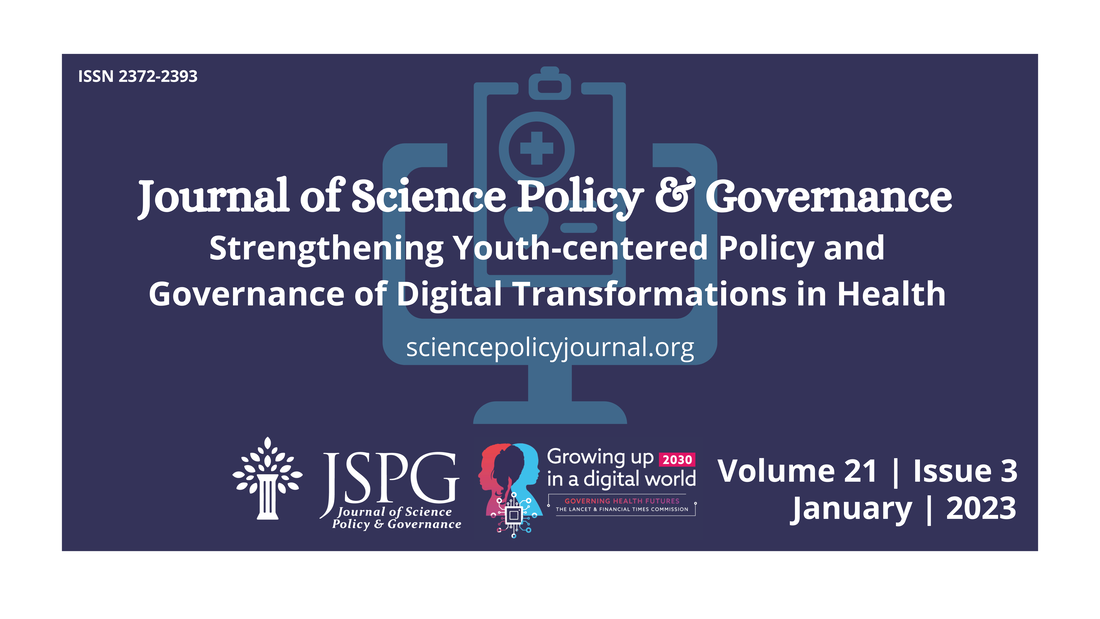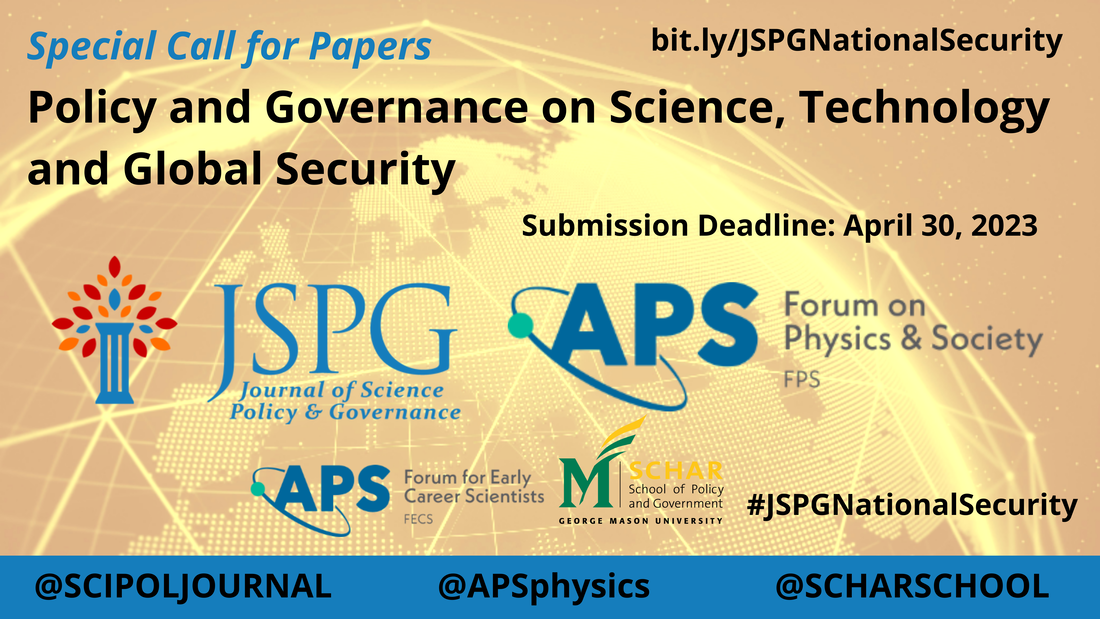|
Media contacts
GHFutures2030 Whitney Gray [email protected] (+41) 22 908 4544 Journal of Science Policy & Governance André Porter [email protected] (202) 730-9502 Washington, DC (January 23, 2023) – The Journal of Science Policy & Governance (JSPG) and The Lancet and Financial Times Commission on Governing health futures 2030: Growing up in a digital world (GHFutures2030) are pleased to release Volume 21, Issue 03, of the journal, the Special Topics Issue on Strengthening Youth-centered Policy and Governance of Digital Transformations in Health. The Special Issue includes 6 articles addressing topics such as trans and non-binary youth healthcare, regulation of artificial intelligence medical devices, the impact of redlining on broadband adoption, the ethics of whole genome sequencing in pediatric healthcare. “The authors share the Commission’s foundational values for digital health governance; democracy, solidarity, inclusion, equity and human rights. We must fully embed youth and youth organizations, as research fellows, experts and innovators to accelerate progress towards UHC and equitable benefits to young people's health and well-being,” said Ilona Kickbusch, Chair of the International Advisory Board, Global Health Centre at the Graduate Institute of International and Development Studies in Geneva, Switzerland and co-Chair of the Lancet and Financial Times Commission. “At a time when digital transformations are overtaking many policy areas including healthcare, it is increasingly critical to engage young people in shaping our collective future and to center digital and data governance on their innovative views,” said Adriana Bankston, JSPG CEO & Managing Publisher. “JSPG is proud to partner with GHFutures2030 on this special issue and to showcase next generation voices in developing future digital technologies and approaches.” The Special Topics Issue competition, judged by an external review committee, aims to provide winning authors with the opportunity to present at a global digital health event in 2023 and be interviewed on GHFutures2030 Voices of Digital Health podcast. Information on the competition winners will be released at a later date. ### About JSPG
The Journal of Science Policy & Governance is a nonprofit organization and open-access peer-reviewed publication managed by and for students, policy fellows and young scholars in science, technology and innovation policy. JSPG publishes high-quality articles covering the widest range of topics in formats that are accessible to policymakers. Since 2011, JSPG has served as a vehicle for students and early career researchers to bolster their research and writing credentials in science policy. Visit sciencepolicyjournal.org and follow on Twitter @SciPolJournal to learn more. About GHFutures2030 Commission The Lancet and Financial Times Commission on Governing Health Futures 2030: Growing up in a digital world was established in October 2019 to deliver a clear set of recommendations on the governance of digital health, artificial intelligence, and universal health coverage. The Commission report was published in October 2021. It calls for a radical rethink on harnessing the power of digital technologies for our future health and sets out a new approach to digital transformations that promote equitable, affordable and universal improvements to health. The Commission is comprised of nineteen Commissioners representing a wide range of sectors, expertise, and backgrounds. The Commission is supported by the Secretariat which is hosted at the Global Health Centre of the Graduate Institute in Geneva, Switzerland. Visit governinghealthfutures2030.org and follow on Twitter @GHFutures2030 to learn more. Media Contacts
American Physical Society (APS) Forum on Physics and Society Henry Kelly [email protected] Schar School of Policy and Government, George Mason University Gregory D. Koblentz [email protected] Journal of Science Policy & Governance André Porter [email protected] WASHINGTON, DC (January 10, 2023) - The Journal of Science Policy & Governance (JSPG) and the American Physical Society’s Forum on Physics and Society (APS FPS) are pleased to announce a call for papers and competition to explore the ways that scientific and engineering advances may reshape global security concerns and new policy approaches needed to address them, resulting in a special issue focused on Policy and Governance on Science, Technology and Global Security. Students, post-doctoral researchers, policy fellows, early career researchers and young professionals from around the world are invited to submit op-eds, policy position papers and other articles addressing foreign policy and national security challenges. These include articles addressing both the direct impact of new technologies -- such as information technology and biotechnology -- on national defense and the indirect impact of technology-driven changes that could increase or decrease the potential for conflict. Submission deadline: April 30, 2023. This Special Issue is supported in-kind by outreach partners from the American Physical Society Forum on Early Career Scientists (APS FECS) and the Schar School of Policy and Government, George Mason University. “Rapid advances in information technology, biology, energy technologies, and many other areas have the potential to create new areas of conflict, and new solutions to global problems.” said Henry Kelly, Past Chair of the APS Forum on Physics and Society. “These require a fresh approach to a range of domestic and international policies including national security and intelligence policies, foreign policy, economic policy and approaches to international development. A clear understanding of the new threats and opportunities created by scientific and technical advances are an essential part of the solution.” “Topics relevant to science, technology and global security are at the forefront of the policy landscape internationally,” said Adriana Bankston, JSPG CEO and Managing Publisher. “JSPG is thrilled to partner with the APS Forum on Physics and Society on this call for papers to showcase contributions of the next generation to this special issue around national security and foreign policy topics.” In addition to publishing in the special issue, accepted papers will be entered into a policy paper competition, where a committee of experts in the science policy-security interface will select the top three articles. First, second and third place article winners will have the opportunity to present published work at events hosted by the APS Forum on Physics and Society. Leading up to the submission deadline, JSPG and APS FPS will organize a series of training sessions to provide prospective authors with opportunities to practice policy writing, and to inspire and empower them with expert perspectives on science-policy communication to inform their submissions to the Special Issue. APS is a sponsor and is not responsible for the content of the special issue. ### About JSPG
The Journal of Science Policy & Governance (JSPG) is an international, open access peer-reviewed publication managed by and for students, policy fellows, and young scholars in science, technology, and innovation policy. JSPG publishes high-quality articles covering the widest range of topics in formats that are accessible to policymakers. Since 2011, JSPG has served as a vehicle for students and early career researchers to bolster their research and writing credentials in science policy. Visit sciencepolicyjournal.org and follow on Twitter @SciPolJournal to learn more. About APS FPS The American Physical Society’s Forum on Physics and Society (FPS) is a forum of the American Physical Society, organized in 1971 to address issues related to the interface of physics and society as a whole. Founded in the late 1960s, FPS has been active in exploring policy issues such as nuclear weapons and nonproliferation, autonomous weapons, environmental challenges, and cybersecurity. It has also been active in exploring ways to encourage equity and inclusion in the physics community. Visit https://engage.aps.org/fps/home to learn more. About APS FECS The APS Forum for Early Career Scientists (FECS) was established in 2016 to enhance APS's ability to meet the needs of early career scientists and promote career path development, as well as foster scientific communication and cooperation between early career scientists working in different fields all over the world. FECS is focused on serving scientists working in the early stages of their careers, especially recent graduates, postdocs, and junior faculty, but welcomes membership from all career stages. Visit https://engage.aps.org/fecs/home to learn more. About the Schar School of Policy and Government at George Mason University George Mason University’s Schar School of Policy and Government prepares undergraduate and graduate students to be leaders and managers who solve problems and advance the public good in all sectors and levels of government—in the United States and throughout the world. Located where policy happens—just 3 miles from the Pentagon, 4 miles from the White House, and 6 miles from the U.S. Capitol Building—students are connected to jobs, internships, networking, and experiences that can only be found in the Washington, D.C., area. Visit see: https://schar.gmu.edu and follow on Twitter @ScharSchool to learn more. |
JSPG NewsAll the latest news from the Journal of Science Policy & Governance. Archives
April 2024
Categories
All
|
- Home
- About
-
Volumes
- Volume 24 Issue 01
- Sigma Xi and Rita Allen Foundation - Civic Science for Transformative Policy Solutions to Societal Challenges
- Volume 23 Issue 01
- APS Policy and Governance on Science, Technology and Global Security
- IAI Development Policy and Global Change Science to Achieve the Vision of Sustainable Americas
- Volume 22 Issue 01
- GHFUTURES2030 Strengthening Youth-centered Policy and Governance of Digital Transformations in Health.
- UNESCO AND MGCY OPEN SCIENCE POLICIES AS AN ACCELERATOR FOR ACHIEVING THE SUSTAINABLE DEVELOPMENT GOALS
- Volume 21 Issue 01 >
- JSPG and UCL STEAPP Special Topics: Innovations in Science Diplomacy >
- Sigma XI-JSPG Special Issue: Re-envisioning STEM Education and Workforce Development for the 21st Century
- Volume 20 Issue 01
- JSPG Volume 19 Issue 01 (10 Years of Publishing)
- Special Issue: 2021 NSPN-JSPG Policy Memo Competition
- Special Issue: Shaping the Future of Science Policy
- JSPG-UK SIN Special Issue: Climate Change Solutions
- Volume 18 Issue 01
- Special Issue: 2020 NSPN-JSPG Policy Memo Competition
- Volume 17 Issue 01 (Supported by AAAS STPF)
- JSPG-UN MGCY Special Issue: Impacts of Emerging Technologies
- Volume 16 Issue 01
- Volume 15 (Supported by CSPC)
- Special Issue: 2019 NSPN-JSPG Policy Memo Competition
- Volume 14
- Volume 13
- Volume 12
- Volume 11
- Volume 10
- Volume 9
- Volume 8
- Volume 7
- Volume 6
- JSPG-UCS Special Issue: Healthy Food Policy
- Volume 5
- Volume 4
- Special Issue: Hot Topics 2013
- Volume 3
- Volume 2
- Volume 1
- Submit to JSPG
- Announcements
- Events
- Training
- Media Mentions
- Policy in action
- Podcast



 RSS Feed
RSS Feed
